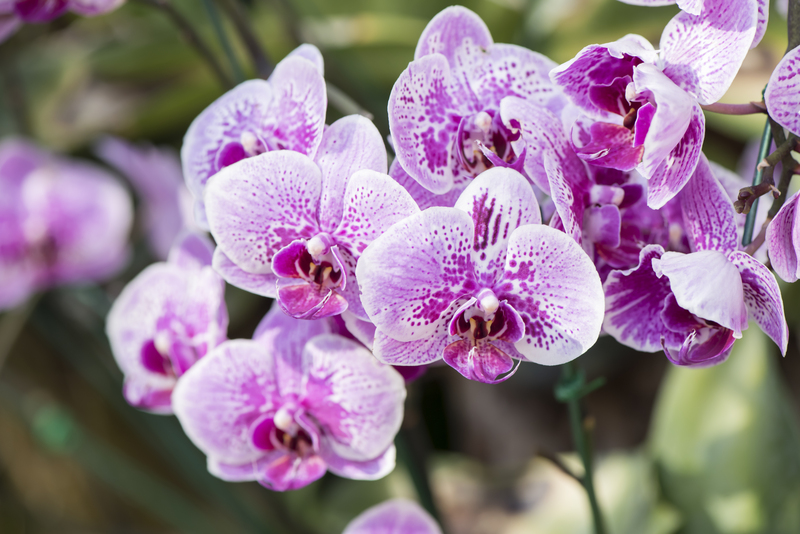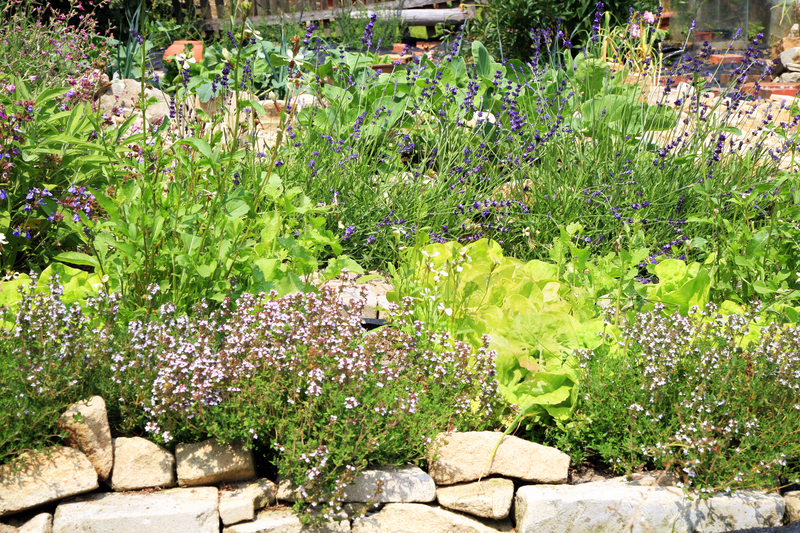Building Lush Gardens with Composting Innovations
Posted on 24/09/2025
Building Lush Gardens with Composting Innovations
Composting innovations are revolutionizing how gardeners build lush, thriving gardens that are both ecologically sustainable and richly productive. Today's modern composting techniques go beyond the basic backyard bin, offering creative ways to transform kitchen scraps and yard waste into a nutrient-rich resource for vibrant gardens. In this comprehensive guide, we'll explore how embracing state-of-the-art composting solutions can unlock your garden's full potential, reduce waste, and foster a healthier ecosystem right at home.

Why Composting is Crucial for Garden Health
Composting is much more than simply recycling organic waste. It's at the heart of a healthy, fertile garden ecosystem. By converting organic matter into humus, compost:
- Enriches soil with vital nutrients
- Improves soil structure and water retention
- Encourages beneficial microbial activity
- Reduces reliance on chemical fertilizers
- Diverts waste from landfills, reducing greenhouse gas emissions
Innovative composting techniques allow gardeners to optimize these benefits, supporting the lushest, most resilient plant life possible.
Emerging Composting Innovations for Lush Gardens
1. Bokashi Composting: Fermenting Your Way to Rich Soil
One standout in the world of advanced composting is the Bokashi method. Originating in Japan, Bokashi uses beneficial microbes to ferment kitchen scraps--even meats and dairy--right in your kitchen. This closed-loop system neutralizes odors and speeds up the breakdown process.
- Quick Results: Bokashi compost is ready in just two to four weeks.
- Odorless Process: Fermentation prevents unpleasant smells.
- Low Maintenance: No regular turning required.
- Versatile: Breaks down materials traditional composting can't handle, such as dairy, oils, and meat.
How to Use in Your Garden: After the initial fermentation, simply bury the Bokashi mix in your garden soil for instant nutrient enrichment and lush plant growth.
2. Vermicomposting: Harnessing Nature's Decomposers
Vermicomposting, or worm composting, harnesses the power of red wigglers to transform food scraps directly into "black gold"--the ultimate garden compost. This method excels in producing a finely textured, nutrient-dense compost perfect for lush vegetable beds, flower borders, and container gardens.
- Compact: Fits conveniently under sinks or in garages.
- Efficient: Worms digest scraps rapidly, producing compost in a matter of weeks.
- Rich in Nutrients: Castings are packed with plant-friendly minerals and beneficial microbes.
Pro Tip: Worm tea, a byproduct of vermicomposting, makes an excellent liquid fertilizer when diluted with water.
3. Hot Composting: Speed Meets Sustainability
Hot composting represents a step up in composting innovation for gardeners who want rapid results. By carefully balancing greens (nitrogen-rich materials) and browns (carbon-rich materials) and maintaining the right moisture level, you can create finished compost in as little as four weeks.
- Rapid Decomposition: Heat-loving microbes break down waste quickly.
- Weed & Pathogen Control: High temperatures neutralize weed seeds and harmful pathogens.
- Minimal Odor: With balanced input, smells are kept at bay.
Tip: Use a compost thermometer to keep the pile in the optimal range--between 130?F and 160?F--for best results.
4. Trench and In-situ Composting: Feed Your Soil Directly
An age-old yet highly effective composting innovation is trench composting. Simply dig a trench or hole in your garden, fill it with organic waste, and cover it with soil. Microbes and worms work underground to decompose materials right where your plants need them most.
- Minimal Labor: No bins or turning required.
- Direct Nutrient Delivery: Roots access compost directly for lush, healthy growth.
- Improves Soil Texture: Increases organic matter exactly where you need it.
This method saves time and energy, fostering lush gardens through composting in a natural, low-maintenance way.
Innovative Tools and Technologies for Advanced Composting
Recent years have brought exciting tools designed for the modern composting enthusiast. From tumblers to smart sensors and countertop composters, these innovations are simplifying and accelerating the process of compost creation.
Smart Composting Tumblers
Compost tumblers have been improved to include features like insulated walls, easy-spin handles, and built-in aeration. These devices streamline the composting process by ensuring even mixing and optimal airflow--key ingredients in producing high-quality compost for lush gardens.
- Faster Composting: Regular turning introduces oxygen, speeding breakdown.
- Pest Proof: Sealed designs keep rodents and critters out.
- Odor Management: Advanced ventilation minimizes smells.
Look for dual-chamber tumblers to process one batch while starting another--ensuring a steady supply of compost all season long.
Countertop Composters and Food Cyclers
For urban gardeners or those with limited outdoor space, electric composters and food cyclers offer a quick and convenient way to reduce kitchen waste. These high-tech gadgets dry, grind, and deodorize food scraps, turning them into a soil amendment in just a few hours.
- Ideal for Apartments: Compact and odorless designs fit any kitchen.
- No Outdoor Pile Required: Compost year-round, regardless of climate.
- Zero Waste Lifestyle: Divert significant waste from landfills.
While not a direct replacement for traditional compost, these innovations are perfect for supplementing soil health in container gardens or balconies.
Compost Aerators and Monitoring Tools
Modern aerators, moisture meters, and temperature probes help even novice gardeners master the science of composting. By tracking oxygenation, hydration, and heat, these tools ensure your compost pile reaches its full potential--resulting in lusher, more productive gardens.
- Prevent Common Pitfalls: Avoid soggy, smelly, or slow piles.
- Maximize Decomposition: Fine-tune inputs for rapid results.
- Boost Confidence: Take the guesswork out of composting for beginners.
Best Composting Practices for Ultra-Lush Gardens
Layering for Success
A key principle in lush garden composting is alternating green (nitrogen) and brown (carbon) materials. Strive for a ratio of approximately 2:1 browns to greens for a balanced, healthy pile. Good examples to layer include:
- Greens: Vegetable scraps, coffee grounds, lawn clippings
- Browns: Dried leaves, cardboard, straw, shredded newspaper
Proper layering ensures efficient decomposition and minimizes smell, giving you rich compost for garden beds and borders.
Moisture and Aeration: The Secret to Rapid Decomposition
Compost piles should remain damp, but never soggy--think of a wrung-out sponge. Regular turning, using a pitchfork or aerator, adds oxygen and prevents compaction, which is vital for the microbes responsible for breaking down materials.
- Tip: If your compost pile isn't heating up, it may need more greens or water. If it's slimy or smelly, add more browns and turn it more frequently.
Patience Pays Off
Even with composting innovations, quality compost takes a little time. The reward for patience is rich, crumbly, earthy-smelling compost teeming with beneficial microbes--ready to fuel lush, vigorous plant growth.
Integrating Compost into Every Corner of Your Garden
1. Top Dressing Garden Beds
Scatter a generous layer of finished compost across flower beds and vegetable gardens each spring. This delivers nutrients right where roots need them, suppresses weeds, and retains moisture for greener, lusher plants.
2. Mulching Trees and Shrubs
Apply a ring of compost around the base of trees and shrubs--but not touching the trunk--to protect roots, deter pests, and conserve soil moisture.
3. Creating Compost "Tea"
Compost tea is a liquid extract rich in microbial life and nutrients. Brew by steeping a shovel of compost in water for 1-3 days, then apply to plant leaves or soil. This natural elixir invigorates plants and boosts disease resistance.
4. Potting Mix Power-Up
Mix screened compost into potting soil for container gardens. The added organic matter ensures potted plants get the nourishment and moisture they crave.
Case Study: Transforming a Dull Landscape into a Lush Haven
Consider the story of a suburban gardener struggling with clay-heavy, nutrient-poor soil. By implementing Bokashi composting in winter, trench composting in early spring, and supplementing with worm castings, they radically improved soil texture and nutrient balance. Within a year, the once-struggling beds bloomed with vibrant flowers, flourishing vegetables, and towering sunflowers.
This transformation, powered by composting innovations, highlights how innovative organic recycling methods are the cornerstone for lush gardening success.
Composting Innovations and Sustainability
Building lush gardens with composting innovations isn't just about beauty or bounty--it's a crucial step toward sustainability. Integrating advanced composting into your routine reduces landfill contributions, minimizes dependence on synthetic fertilizers, and fosters a resilient, climate-friendly landscape.
- Zero Waste: Divert up to 30% of household waste with modern composting systems.
- Reduce Chemical Use: Nourish plants organically, improving soil health over time.
- Support Pollinators: Rich, chemical-free soils foster bee and butterfly habitats.
- Fight Climate Change: Lower methane emissions from landfills by recycling organics at home.
As communities and municipalities increasingly invest in composting technology, more opportunities arise to close the loop and build truly sustainable urban and suburban gardens.

Frequently Asked Questions About Composting Innovations
- Can I compost during winter? Yes! Many advanced composting systems, such as insulated tumblers and indoor worm bins, continue working even in cold weather.
- What items should I avoid composting? Skip large quantities of meat, dairy, oils, pet waste, and heavily treated wood. Bokashi systems handle some of these, but caution is advised.
- How often should I turn my compost pile? Aim for every 5-7 days in a hot compost system. Innovative tumblers make this much easier!
- Can compost benefit every type of plant? Absolutely. From lawns and trees to delicate houseplants, compost improves soil structure and boosts growth across the board.
Conclusion: Cultivating Lush Gardens with Composting Innovations
Embracing composting innovations opens the door to lusher, healthier, and more sustainable gardens. Whether you're using Bokashi fermentation, vermicomposting, trench methods, or modern tumblers, these advanced techniques not only supercharge your soil but also benefit the environment.
By integrating both new technologies and time-honored composting wisdom, you'll turn waste into abundance--cultivating a garden that's as rich in biodiversity as it is in beauty. Start today, and watch your landscape thrive with lush results only composting can deliver.
Latest Posts
Building Lush Gardens with Composting Innovations
Maximize Your Garden's Potential with Creative Seating Ideas
How community gardens are helping to combat climate change

